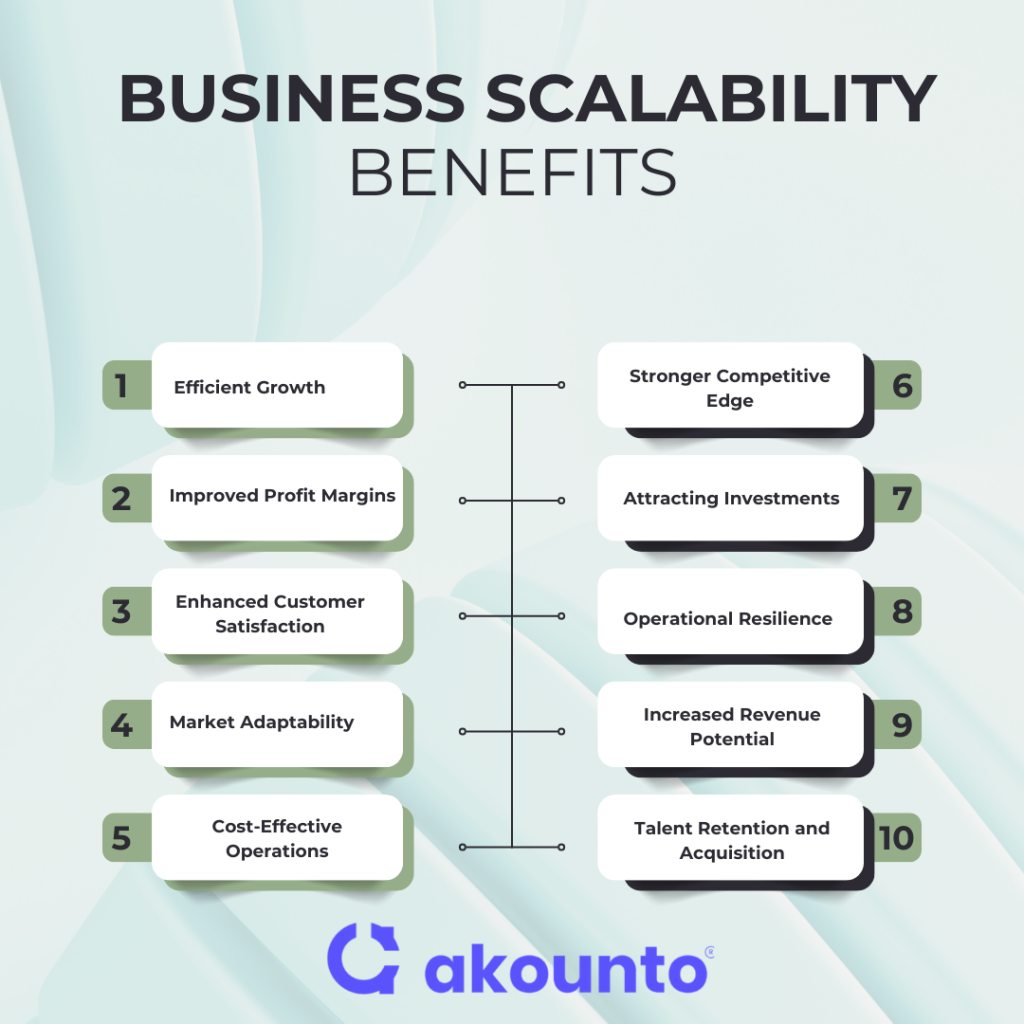Learn Business Scalability from Soniya Malik, Founder and CEO of Akounto

Learn Business Scalability from Soniya Malik, Founder and CEO of Akounto
Defining Scalability in Business Terms
Scalability refers to a company's ability to grow and handle increased demand without compromising efficiency or operational quality.
A scalable business model ensures that growth does not necessitate a proportional increase in costs or resources, enabling sustainable expansion.
Scalable firms can effectively handle rapid growth, ensuring profitability even as sales volumes increase. By maintaining operational efficiency, such businesses optimize resource utilization, reduce overheads, and position themselves as attractive to investors.
Scalable systems provide resilience, allowing companies to adapt seamlessly to market changes without disrupting their core functions.
In today’s era, driven by AI and advanced technologies, scalability is no longer optional—it is a fundamental requirement for survival.
Businesses leveraging tools such as automation, cloud computing, and digital advertising strategies can scale operations more effectively than ever before.
Scalable businesses are agile, data-driven and have a robust infrastructure. For example, scalable systems prioritize automation to minimize manual dependencies, ensuring consistent performance regardless of volume changes. This adaptability helps in managing increased demand while maintaining customer satisfaction.
To build a scalable business, leaders should focus on implementing strategies that prioritize efficiency and sustainability. Techniques such as adopting modular systems, outsourcing non-core functions, and investing in digital tools enable businesses to grow without overextending resources. Few examples include incorporating cloud solutions to streamline operations and leveraging digital advertising strategies to expand market reach.
Key Indicators of a Scalable Business Model

Economies of Scale
Economies of scale refer to the cost advantages achieved as businesses grow rapidly and expand their operations. By distributing fixed costs across a higher volume of production, scalable businesses can lower per-unit costs and improve profitability. This indicator is often considered scalable because it highlights a company’s ability to handle increased demand without proportionally increasing expenses.
For a growing business, economies of scale enable sustainable growth and help maintain competitive pricing in the market. By leveraging efficient operating systems and optimizing procurement or manufacturing processes, companies can scale quickly while reinvesting savings into enhancing their IT systems, customer base, and digital advertising strategies.
Soniya Malik Emphasises on building Efficient Work Processes
“Processes make or break growth. Streamline everything—remove inefficiencies and prepare your operations for handling double the load tomorrow.” says Soniya Malik, who believes that making systems if far more effective that having standalone teams.
Efficient work processes involve streamlined internal processes designed to maximize productivity and minimize waste. These processes include standard operating procedures (SOPs), well-documented workflows, and scalable systems that adapt to the growing business without adding unnecessary complexity.
Efficient processes allow a company to handle rapid growth and deliver the same goals with fewer resources. By investing in software systems and automation, businesses can scale quickly while maintaining high performance and meeting the demands of more customers, ensuring successful scaling over time.
KPIs to Measure Performance
Key Performance Indicators (KPIs) are metrics used by C-level executives and managers to evaluate a company's performance. These metrics include customer acquisition rates, revenue growth, and operational efficiency, providing clear insights into areas that require improvement or investment.
Tracking KPIs is critical for sustainable growth and scalability. They help businesses identify bottlenecks in internal processes and assess the effectiveness of digital advertising strategies. By analyzing these metrics, companies can align their efforts to attract new customers, expand their customer base, and remain competitive in their industry.
Leadership
Leadership is a cornerstone of any scalable business. Visionary leaders play a vital role in setting strategic goals, fostering innovation, and cultivating a culture that supports growth. Effective leaders prioritize hiring the best talent and ensuring teams align with the company's products and objectives.
Leadership drives scalability by managing new hires, overseeing IT systems integration, and guiding other aspects of a company’s scaling journey. With strong leadership, businesses can handle rapid growth, maintain consistent brand messaging, and achieve successful scaling.
Automation and Digitization
Automation and digitization utilize technology to replace manual tasks and optimize internal processes. Common tools include customer relationship management (CRM) software systems, automated invoicing, and AI-driven analytics, all designed to reduce workload and enhance efficiency.
Scalable businesses rely on automation to grow rapidly without adding resources at the same rate. These systems improve the ability to serve new customers, streamline IT systems, and adapt to increased demand, making them integral to achieving sustainable growth and remaining competitive.
Soniya Malik adds, "Scalability starts with technology. Invest in systems that grow with you, like cloud solutions and automation. They’re your backbone when scaling up.”
Consistent Brand Messaging
Consistent brand messaging ensures a unified identity for a company’s products across all communication channels. It involves maintaining a coherent tone, visuals, and messaging that resonate with both existing and new customers.
This consistency builds trust and loyalty, enabling businesses to scale quickly while keeping their customer base engaged. As a growing business enters new markets, consistent messaging simplifies customer acquisition and strengthens its reputation, a key factor for successful scaling.
Brand Enforcement
Brand enforcement is the process of protecting a company's identity by adhering to brand guidelines and maintaining quality standards. This includes monitoring brand usage, securing trademarks, and ensuring uniform representation across all platforms.
By enforcing the brand, businesses can handle rapid growth without diluting their reputation. This practice helps scalable businesses maintain the same goals as they expand their reach, ensuring new hires and teams operate with shared values, ultimately supporting sustainable growth.
Ability to Raise Funds
The ability to raise funds involves securing capital through investments, loans, or partnerships to support scaling initiatives. For scalable systems, accessing capital is critical to fund IT systems upgrades, expand infrastructure, and onboard the best talent.
By raising funds, businesses can grow rapidly, adding resources to meet increased demand. This financial flexibility ensures they can remain competitive while targeting sustainable growth through strategic investments in software systems and other aspects of scaling.
L&D Department for Employees
A Learning and Development (L&D) department focuses on equipping employees with the skills needed to support scalability. It involves continuous training, upskilling, and onboarding programs designed to prepare the workforce for new challenges.
Investing in L&D enables businesses to scale quickly by fostering innovation and aligning teams with the company’s goals. Training new hires ensures consistency in service delivery and allows the organization to handle rapid growth while maintaining high performance and a competitive edge.
Benefits of Scalability

- Efficient Growth: Enables businesses to grow rapidly without a proportional increase in costs or resources, ensuring sustainable growth.
- Improved Profit Margins: Scalable systems optimize resource use, reducing overheads while revenue increases.
- Enhanced Customer Satisfaction: Seamlessly meeting increased demand ensures consistent service delivery for more clients and new customers.
- Market Adaptability: Scalable businesses can quickly adjust to industry trends and enter new markets with minimal disruption.
- Cost-Effective Operations: Automation and efficient tools streamline processes, reducing the need for substantial increases in staff or hardware.
- Stronger Competitive Edge: Scalability helps businesses remain competitive by responding to market demands faster than rivals.
- Attracting Investments: A scalable business model appeals to investors seeking long-term growth potential.
- Operational Resilience: Scalable systems enhance the ability to handle rapid growth and adapt to unforeseen challenges.
- Increased Revenue Potential: By efficiently handling demand, businesses can serve more customers and drive substantial growth in earnings.
- Talent Retention and Acquisition: Scalable businesses attract the best talent by fostering a stable and growth-oriented environment.
Strategies to Achieve Scalability and Meet Growing Demand
Streamlining Operations for Efficiency
Streamlining operations involves refining processes to eliminate redundancies, optimize resource allocation, and enhance productivity. A scalable business thrives on efficient workflows that allow it to manage growth without significant increases in costs or complexity. This strategy ensures that as demand for services or products grows, the company’s systems can handle the increased workload effectively.
Soniya Malik - Founder and CEO of Akounto, with her background in engineering emphasises on achieving modularity in work processes, she adds, “Modular thinking works wonders. Build your business in blocks that you can expand independently without disrupting the whole.”
Small businesses can implement streamlined operations by mapping existing workflows, identifying bottlenecks, and leveraging effective tools such as task management software or process automation systems.
For example, a service provider could automate client scheduling using scalable systems, enabling them to handle more clients without hiring additional employees. Tools like CRM software also help maintain customer relationships efficiently as new customers come on board.
Before streamlining, businesses should conduct a comprehensive audit of their processes and systems. Training employees on new tools and ensuring compatibility with existing hardware and software are essential. Allocating budget for automation tools and developing a clear implementation timeline will prepare the business for successful scaling while aligning with core values.
Building a Flexible Organizational Structure
A flexible organizational structure is designed to adapt to changing industry demands, customer needs, and market trends. It emphasizes cross-functional teams, decentralized decision-making, and scalable systems that empower employees at all levels. This approach helps businesses respond quickly to growth opportunities and challenges.
Small businesses can create flexibility by cross-training employees, promoting collaboration across departments, and redefining roles as needed. For example, a retail business entering new markets could assign team members to oversee both online and offline sales channels. Leveraging part-time or freelance talent for specific tasks ensures scalability without permanent increases in headcount or costs.
Preparation involves reassessing job descriptions, creating a talent pipeline, and setting up regular feedback mechanisms to track organizational agility. Training programs to upskill employees and empowering C-level executives with data-driven insights will ensure the structure evolves alongside the company’s products and services.
Soniya Malik is a peoples person, she always upholds that it is finally the employees who are handling and delivering the work processes, their training and upgraded skills adds synergy to the process. Soniya further adds, “Your team is your greatest asset. Develop talent that can handle higher stakes and evolving roles as your business scales.”
Leveraging Outsourcing and Partnerships
Outsourcing and strategic partnerships allow businesses to access external expertise, reduce operational burdens, and scale their offerings quickly. By collaborating with specialized service providers, a business can focus on its core competencies while efficiently handling a substantial increase in demand.
Small businesses can outsource non-core activities such as payroll, IT support, or digital marketing to experienced partners. For example, outsourcing digital marketing strategies can help attract new customers without straining internal resources. Establishing partnerships with suppliers or distributors enables seamless market expansion without heavy upfront investments in infrastructure.
Soniya Malik emphasizes that buidling strong business relations leads to business scaling and growth. Sourcing the right vendor, resource mobilisation, getting timely market insights, every aspect in the business environment is related to being aware in advance and getting prepared for it.
Before outsourcing, businesses need to identify key functions that can be delegated without compromising quality. Researching reputable vendors, negotiating contracts, and ensuring alignment with core values are essential steps. Businesses should also establish performance metrics to evaluate the success of these partnerships.
Investing in Scalable Technology
Scalable technology, including cloud computing, automation tools, and advanced hardware systems, enables businesses to grow rapidly while maintaining efficiency. These systems support increased demand by providing seamless integration, better data management, and improved collaboration.
Small businesses can adopt cloud-based tools for document sharing, customer management, and team communication. For instance, using cloud storage reduces dependency on physical hardware, ensuring flexibility and scalability. Automation tools like chatbots and invoicing software enable businesses to serve more clients and reduce manual effort.
Preparing for technology adoption requires assessing existing systems and ensuring compatibility with new tools. Budget allocation for initial setup and ongoing maintenance is critical. Businesses should also train employees to use these tools effectively, ensuring smooth transitions and avoiding disruptions to daily operations.
Enhancing Customer Experience Through Personalization
Personalized customer experiences drive loyalty and satisfaction, especially in a growing business. Customizing interactions and offerings based on customer preferences fosters deeper relationships and encourages repeat business, a key component of scalability.
Small businesses can use CRM tools to track customer preferences and tailor their communications. For example, an e-commerce platform could recommend products based on previous purchases, increasing the likelihood of revenue increases. Personalized email campaigns and targeted promotions are effective ways to build a loyal customer base.
Businesses need to collect and analyze customer data responsibly, ensuring compliance with privacy regulations. Training employees to use CRM software and segment customer data for actionable insights is crucial. Establishing clear goals for personalization efforts ensures alignment with broader scalability strategies.
Maintaining Profitability Amidst Sales Growth
Cost Management Techniques
Effective cost management involves identifying and controlling expenses to sustain profitability during sales growth. Businesses should implement budgeting tools, monitor operational costs, and negotiate better vendor contracts.
Automating repetitive tasks and optimizing supply chains are practical steps to reduce costs. These techniques ensure businesses can scale while maintaining healthy profit margins and efficient resource use.
Pricing Strategies for Scalable Growth
Implement dynamic pricing models that adjust based on demand and customer segments. Offering tiered pricing for different products or services can cater to various budgets.
By analyzing market trends and using data analytics, businesses can set competitive prices that attract new customers and boost revenue. Scalable pricing strategies allow for sustained profitability and customer retention.
Enhancing Operational Efficiency
Focus on streamlining processes and adopting scalable systems to improve productivity. Automating workflows and integrating technology can reduce errors and speed up operations.
Implementing lean methodologies and continuous process improvements ensures the business can handle rapid growth effectively. Enhanced efficiency translates into lower operational costs and better service delivery.
Meeting Customer Demands Without Overhauling Operations
Implementing Scalable Customer Service Solutions
Adopt scalable customer service tools like AI-powered chatbots and self-service portals to handle increased customer interactions. These solutions ensure fast response times and consistent service quality.
Integrating these tools with CRM systems allows businesses to manage queries efficiently, enhance customer satisfaction, and reduce the strain on support teams during periods of rapid growth.
Personalization at Scale
Use data analytics and CRM tools to personalize customer experiences across channels. Segment customers based on preferences and behavior to tailor communications and product recommendations.
Personalized marketing campaigns and customized offers foster loyalty, improve engagement, and attract more clients. This strategy ensures businesses can scale while maintaining strong customer relationships.
Continuous Feedback Loop and NPS Score Tracking
Establishing a continuous feedback loop involves collecting regular input from customers to identify their needs and satisfaction levels. Tools like surveys, reviews, and Net Promoter Score (NPS) tracking enable businesses to gather actionable insights.
Implementing these systems helps businesses address issues proactively and align services with customer expectations. Monitoring NPS scores provides a clear metric to measure customer loyalty and improve retention, ensuring scalability without compromising service quality.
Soniya Malik Believes that Scalability is Growth
Scalability offers sustainable growth, enabling businesses to meet increased demand, maintain profitability, and enhance customer satisfaction. Scalability is growth and without growth the company is finished. By adopting efficient systems, leveraging technology, and staying aligned with core values, businesses can scale successfully, attract new opportunities, and thrive in competitive markets without compromising quality or identity.




